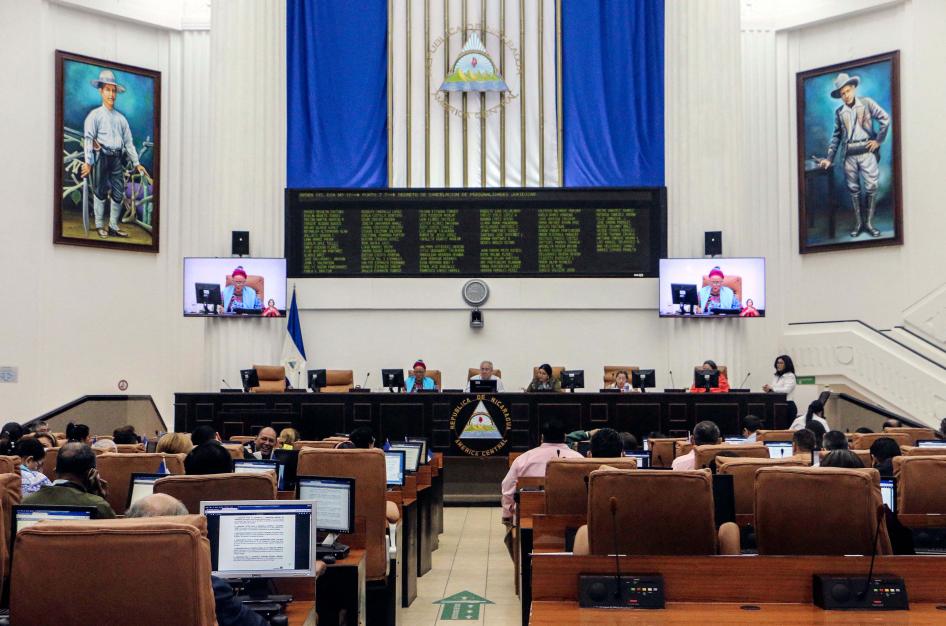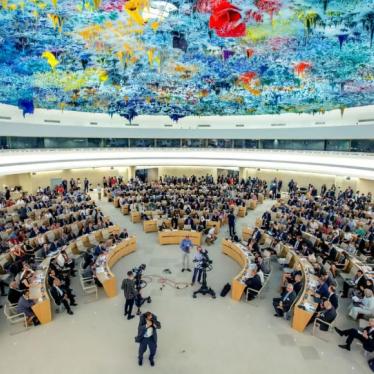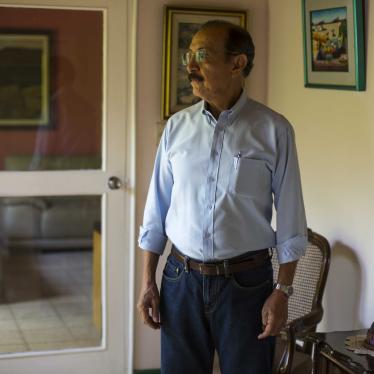(Washington, DC) – Nicaraguan authorities have closed hundreds of nongovernmental organizations, applying highly restrictive legislation that undermines freedom of association and freedom of expression, Human Rights Watch said today. Concerned governments, especially from Latin America, should condemn this systematic dismantling of civil society groups, which play a critical role in a country that has no independent state institutions left to act as a check on executive power.
Since June 6, 2022, Nicaraguan authorities have passed laws and resolutions canceling the legal registration of over 770 nongovernmental organizations and foundations, effectively forcing them to shut down their operations in the country. These include medical associations and organizations working on a range of issues from child protection to women’s rights to climate change mitigation. The government has canceled the registration of more than 950 organizations since 2018. Many of these decisions are based on abusive legislation, including a “foreign agents” law, passed in recent years by lawmakers allied with the administration of President Daniel Ortega.
“The Ortega administration in Nicaragua has systematically shut down human rights organizations and other nongovernmental groups to halt their efforts to expose abuses and the authorities’ inability to provide services to the Nicaraguan people,” said Tamara Taraciuk Broner, acting Americas director at Human Rights Watch. “Nicaraguan authorities are so obsessed with wiping out civic space that they’ve gone after groups that provide critically important aid to poor communities in a country that has been severely affected by two hurricanes and a pandemic.”
Among these recent actions is the National Assembly’s decision to cancel, on June 30, the legal registration of 100 groups, saying they had failed to submit “detailed financial statements,” the names of their board members, “prior international donations,” and “information on the identity and source of all donors,” and that they had failed to “promote policies of transparency, integrity, and public trust.”
Shutting down nongovernmental organizations is part of a much broader effort to silence civil society groups and independent media through a combination of repressive tactics that include abusive legislation, intimidation, harassment, arbitrary detention, and prosecution of human rights defenders and journalists. Since taking office in 2007, the Ortega administration has dismantled all institutional checks on presidential power, including the judiciary.
Among the groups stripped of their legal registration are dozens of humanitarian organizations, which play a critically important role in ensuring access to health services, water, and food for low-income, mostly rural communities.
In mid-March 2022, the National Assembly canceled the legal registration of a global medical charity that provides free health care to children and adults. For over 20 years, the organization had operated medical programs in several cities across the country and provided health care to thousands of Nicaraguans. It was one of 25 groups closed on the same day in March by the National Assembly, which said the groups “had not complied with and violated laws,” without further explanation.
In mid-August 2021, the Interior Ministry canceled the registration of an international development organization that had operated in Nicaragua for decades, including by fostering climate change resilience and food security. The work of the organization, which provided support to thousands of people in the last few years, focused primarily on improving social and economic conditions for women and Indigenous communities on the Caribbean Coast and in the northern part of the country.
Several other groups were stripped of their registration in mid-August. The authorities said the groups had failed to comply with legal requirements, including “clearly defin[ing] their financial sources, project portfolio, social impact, and if these are in accordance with the purpose and objectives of the entity.” The development organization publicly rejected the allegations.
Nicaragua has one of the highest poverty rates in Latin America and the Caribbean. In March 2021, UNICEF estimated that in the aftermath of the two 2020 hurricanes, about “1.8 million people, including 720,000 children, [we]re still in need of humanitarian aid, especially among the indigenous communities of the North Caribbean Coast of Nicaragua.”
The authorities have offered no clear explanation for each registration cancellation. The official decisions simply state that the organizations affected had not complied with legislation – specifically, abusive laws adopted by National Assembly members allied with the Ortega administration, including the “foreign agents” law adopted in October 2020 and the General Law for the Regulation and Control of Non-Profit Organizations adopted in March 2022.
The “regulation and control of non-profit organizations” law allows the Interior Ministry to ask the National Assembly to cancel the legal registration of groups for “using the organization[s] to promote campaigns to destabilize the country.”
The legislation allows the authorities to seize a group’s assets if its registration is canceled because it committed “unlawful acts,” violated “public order,” or hindered the Interior Ministry’s “control and surveillance.” The law states that all organizations can only have a maximum of 25 percent of “foreign members.”
The “foreign agents” law requires people or entities to register as “foreign agents” with the Interior Ministry if they “directly or indirectly” receive funding from abroad. Those who fail to register can face fines, the cancellation of their official registration, and confiscation of their property.
To register as a “foreign agent,” a group must obtain a “certificate of registration” from the Interior Ministry, by meeting onerous and broadly defined requirements. “Foreign agents” have to provide reports and updates about any changes to the organization’s “address, contact information,” “members of the board of directors,” or “any other information required by the Interior Ministry.”
They must inform the ministry “in advance” of any funds they receive as well as their “use and destination,” and submit “monthly reports of the activities related to their performance as ‘foreign agents.’” The Interior Ministry can also require organizations to present “additional information” when “deemed convenient.” Without the certificate, organizations are not able “to carry out movements of financial resources and/or material assets,” or open or maintain a bank account.
Several people Human Rights Watch interviewed, including members of civil society groups closed arbitrarily, said the authorities had routinely failed to issue the certificates, based on seemingly arbitrary reasons. Some said that authorities had required the information to be presented on colored paper instead of white paper. Others alleged that authorities had pressed them to remove or replace some board members who were perceived to be government critics as a condition to issue the certificate.
“The implementation of the legislation appears to be designed in a way that makes it impossible to comply with it,” said a former member of a group that was dissolved.









